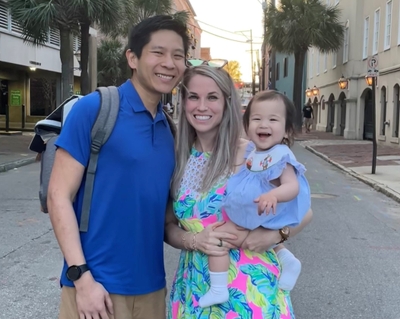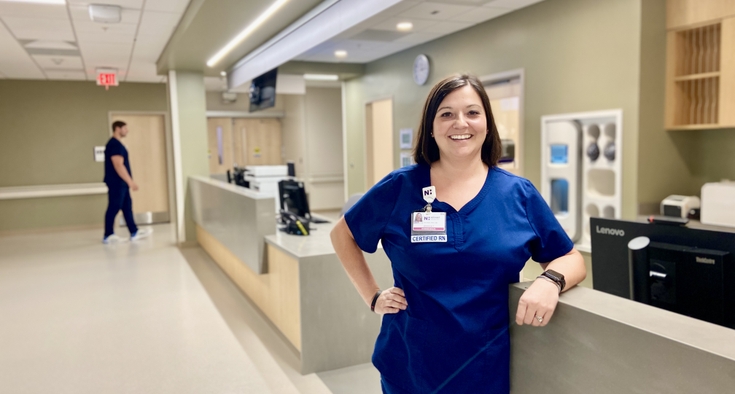For 33-year-old Sarah Wong, there’s nothing like being a mom.
“There's an unconditional love that you have just never experienced before,” Wong said about her 19-month-old daughter, Ryn. “I look at her, and she's absolutely perfect.”
Wong and her husband, Jeremy Wong, have big dreams for their family. They recently purchased 5 acres in the foothills of the Blue Ridge Mountains, where they plan to move and raise four children, three goldendoodles, and goats and chickens.
“I want to fill up the house,” Sarah said.
Achieving this dream has been more challenging than they expected.
Although it’s a personal story, the Wongs are sharing their experience because many couples face obstacles to building their family. About 1 in 4 women of childbearing age who haven’t already been pregnant have difficulty getting pregnant or carrying a pregnancy to term, according to the U.S. Centers for Disease Control and Prevention.
The Wongs want these women to feel less alone — and realize that there may be help available.
Exceptional care for you and your growing family.
Joy. Then heartbreak.
Sarah and Jeremy have been together since 2010 and have been married since 2014. They live in Mount Pleasant, South Carolina, where Jeremy is a software engineer and Sarah is a dental hygienist and serves in the Air Force Reserves.
To their delight, in 2022 Sarah got pregnant. It was an easy pregnancy, ending in a healthy baby — a little girl they call “Ryn,” short for Kathryn.
Six months later, the Wongs began trying for another baby. This time, their experience was harder. Sarah got pregnant, twice, but both pregnancies ended in miscarriages.
In June 2023, Sarah got pregnant again.
“After all the early miscarriages, it was really hard to even say I was pregnant and be excited,” Sarah said. “When I was finally getting to the point of telling people because I couldn't hide it anymore, I was still very reserved with it.”
Still, everything appeared to be going well.
When Sarah was at 20 weeks, the couple traveled to Tennessee to look at a possible piece of property for their growing family. While they were there, Sarah started bleeding.
Doctors at a local medical center found that her cervix was dilated and her membranes were ruptured, meaning the risk of infection and preterm delivery was high. It was too late for an emergency procedure called “rescue cerclage” to hopefully close the cervix, delay delivery, and allow the baby more time to grow.
That day, she had a little boy they named Hundley.
“Since he was 20 weeks, he was too young to go to the NICU or for them to try any life-preserving measures,” Sarah said. Hospital staff wrapped Hundley in a blanket and hat and made molds of his handprints for the family. Heartbroken, the Wongs went home without buying the land. And without their son.
Top scores for safety
Novant Health received the most ‘As’ for patient safety in North Carolina from The Leapfrog Group. With a focus on safety, quality and patient experience, the national, industry-leading nonprofit, evaluates and assigns letter grades ranging from A to F to hospitals across the country. Novant Health’s hospitals with “A” grades outperform 70% of hospitals nationwide for safety and quality.
An explanation — and hope
Back home, Sarah’s OB-GYN referred her to Dr. Christopher Robinson, a maternal-fetal medicine specialist at Novant Health East Cooper Medical Center in Mount Pleasant, to debrief what had happened.
“He spent an hour with me talking about everything,” Sarah said. “He was really great to answer every and any question that I had.”
Robinson explained that Sarah had what’s called “cervical insufficiency” (also known as an “incompetent cervix”), which happens in roughly 1 out of every 100 pregnancies. The cervix is a small opening at the bottom of the uterus that typically stays closed during pregnancy until a woman is ready to give birth — then thins, softens and opens, allowing the baby to exit the uterus.
In cervical insufficiency, the cervix weakens, shortens, or opens too early in pregnancy, which can cause the loss of the pregnancy. Usually, there are no noticeable symptoms until it is too late to save the pregnancy. This was what happened with Hundley.
If a woman has had cervical insufficiency in one pregnancy, she is likely to have it in future pregnancies.
But Robinson also offered hope: There was a procedure Sarah could have done to try to prevent premature labor for future pregnancies. And she wouldn’t even have to leave town to get it done.
‘I knew this was my only hope’
Robinson sent Sarah to Dr. Cary Fishburne, a surgeon at East Cooper Medical Center who focuses on medical and surgical management of the pelvic floor (a specialty called “urogynecology”).
A Navy veteran, Fishburne is an avid “DIY-er” at home. He brings this same spirit to work, where he enjoys “creatively restoring function” through complex procedures.
“I tell patients I’m a carpenter and a plumber,” Fishburne said. “I enjoy the satisfaction of figuring things out, fixing them and making them work better, and giving patients options that they wouldn't have otherwise.”
Fishburne understood where Sarah was coming from.
“She’d been far enough along with her pregnancy to wrap her hopes and dreams along, but came back crushingly disappointed in the outcome,” Fishburne said. “Many people come into the office having recently experienced something very painful — and hoping and wanting to believe in more. They’re also very fearful that they'll go through the same process again.”
Fishburne considers it his goal to help them “navigate that with compassion and honesty,” and “while being very sensitive to where they are coming from,” present any surgical options they may have to help them achieve their dreams for their family.

To Sarah, he offered a minimally invasive option called “robotic-assisted transabdominal cerclage” (also known as “TAC”). This surgery is performed on a woman with a history of cervical insufficiency before she tries to conceive again.
“Doing nothing means they're at very high risk of having the same issue over and over again,” Fishburne said. “TAC is the most direct management strategy for addressing cervical insufficiency that we have.”
During the procedure, Fishburne creates a few small finger-width sized incisions in the navel and on either side of the navel, and inserts a small tube with a video camera (called a “laparoscope”) that makes the inside of the abdomen and pelvis visible. Then — using the da Vinci medical robot to help him work with precision in the small space — he places a strong polyester support band around the base of the cervix. That prevents it from opening and weakening early in future pregnancies.
Since the band keeps the cervix closed, all future pregnancies will require a planned cesarean section. The band can stay in place for any future pregnancies, and when a woman is done having children, the band can stay in place or can be surgically removed.
In women with cervical insufficiency, TAC achieves a fetal survival rate of 90 to 100%. Because the incisions are so small, there’s often less blood loss and lower risk of infection compared to other cerclage methods. There’s no need for a hospital stay, and recovery time is short — especially attractive to Sarah, who didn’t want to miss a moment with Ryn.
After discussing it with Fishburne and researching the surgery through an online support group she was part of, Sarah was all in. “I knew this was my only hope,” Sarah said. “I couldn't go through another loss like that again.”
Surgery day
Many women in Sarah’s support group travel many states away from their home for TAC. Sarah traveled 10 minutes.
Most patients are nervous heading into surgery-- but Sarah was smiling, telling staff, “I'm so excited to be here and to be getting this done.”
When she woke up after the procedure, she felt lighter.
“Before, I would have told you I felt nervous getting pregnant again. Now I feel like, ‘OK, I'm ready,’” Sarah said. “It gave me a fighting chance. It feels so good to know I have done everything I can possibly do at this point to prevent a loss from happening again.”
She was back to her normal activities within a week.
A first for East Cooper Medical Center
Although Fishburne has performed many TACs while part of a Novant Health practice in Charlotte, Sarah’s March 2024 procedure was the first performed at East Cooper Medical Center.
“The team was really excited, not only because of the nice outcome we achieved technically in the operating room,” Fishburne said. “They were excited to be involved in something that could hopefully give this delightful woman the opportunity to have her family dreams and goals realized.”
Outside his office, Fishburne keeps a bulletin board with Christmas cards and baby announcements from patients. “We like to share in your joy,” Fishburne said.

Still hopeful
The Wongs aren’t yet done with their journey.
The couple underwent in-vitro fertilization (IVF) to give them the best chance of avoiding early miscarriages, but two recent egg retrieval cycles were disappointing. They’re currently taking a break from the IVF process and trying to conceive naturally.
Despite the challenges of the last few years, they’re feeling optimistic.
“Hope is the adjective I can use,” Jeremy Wong said. “I would love for Ryn to have siblings. We’re obviously doing everything we can to make that happen, but if it doesn't, I'm still very grateful that Sarah is alive and healthy and Ryn is alive and healthy, and I’m trying to not lose sight of all of the blessings that we've already been given.”
Jeremy said he’s thankful for scientific advances like TAC, which is allowing Sarah to try to get pregnant.
“Without TAC, we wouldn't even be having a conversation about these options. I am absolutely grateful that it exists,” Jeremy said.
With their newly purchased property, the Wongs are moving forward with one of their dreams. And soon, they hope to send Fishburne a photo for his bulletin board.
Editor's note: Shortly after publication, the Wongs received the wonderful news that they are expecting a baby in January. As of now, the pregnancy is going well, Sarah said, reiterating that she is happy to share their story in hopes that it helps other couples.












